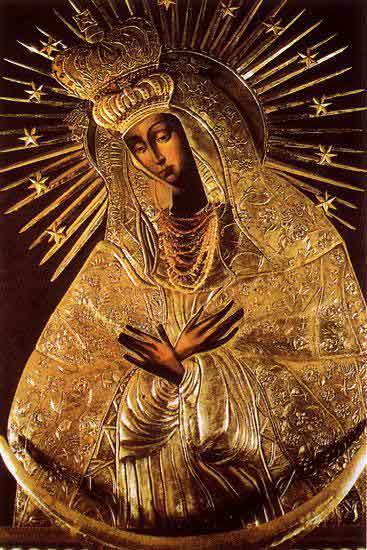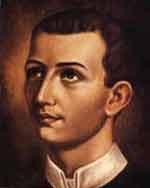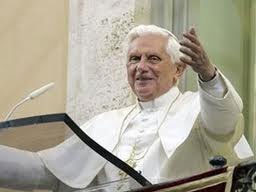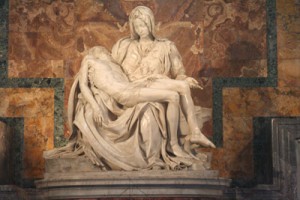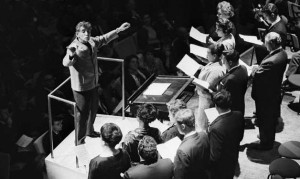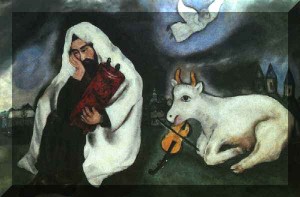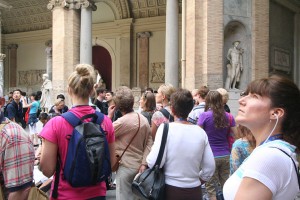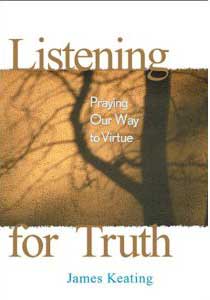VATICAN CITY, 19 OCT 2011 (VIS) –
Some 20,000 pilgrims attended Benedict XVI’s general audience, which was held this morning in St. Peter’s Square. Continuing a series of catecheses dedicated to the Psalms, the Holy Father focused his attention on Psalm 136, “a great hymn of praise which celebrates the Lord in the many and repeated manifestations of His goodness down human history”.
The Pope explained how, in Jewish tradition, this Psalm is sung at the end of the Passover supper, and therefore it was probably also pronounced by Jesus at the last Passover He celebrated with His disciples. The text enumerates God’s many interventions in favour of His people “and each proclamation of a salvific action by the Lord is answered by an antiphon reiterating the main cause for praise: God’s eternal love, a love which, according to the Hebrew term used, implies faithfulness, mercy, goodness, grace and tenderness”.
God is first presented as “He Who ‘does great wonders’, first among them that of the creation: heaven, earth and stars. … With the creation the Lord shows Himself in all His goodness and beauty. He commits Himself to life, revealing a desire for good whence all other salvific actions arise”.
The Psalm goes on to consider God’s manifestations in history, evoking the great moment when the Israelites were freed from slavery in Egypt. The forty years of wandering in the desert were “a decisive period for Israel which, allowing itself to be guided by the Lord, learned to live on faith, obedient and docile to the laws of God. Those were difficult years, marked by the harshness of life in the desert, but also a happy time of confidence and filial trust in the Lord”.
“The history of Israel has known exhilarating moments of joy, of fullness of life, of awareness of the presence of God and His salvation”, said the Pope. “But it has also been marked by episodes of sin, painful periods of darkness and profound affliction. Many were the adversaries from whom the Lord liberated His people”. The Psalm speaks of these events, in particular the Babylonian exile and the destruction of Jerusalem, “when it seemed that Israel had lost everything, even its own identity, even its trust in the Lord. However, God remembers, and frees. The salvation of Israel and of all mankind is bound to the Lord’s faithfulness, to His memory. While man forgets easily, God remains faithful: His memory is a precious casket containing that ‘love which endures forever’ about which our Psalm speaks”.
The Psalm concludes by reminding us that God feeds His creatures, “caring for life and giving
bread. … In the fullness of time the Son of God became man to give life, for the salvation of each one of us; and He continues to gives Himself as bread in the mystery of the Eucharist, so as to draw us into His covenant, which makes us children. So great is God’s merciful goodness, the sublimity of His ‘love which endures forever'”. In conclusion the Pope read a quote from the First Letter of St. John, advising the faithful to bear it in mind in their prayers: “See what love the Father has given us, that that we should be called children of God; and that is what we are”.
AG/ VIS 20111019 (560)Â
raise the Lord, for he is good: for his mercy endures for ever.
2 Praise the God of gods: for his mercy endures for ever.Â
3 Praise the Lord of lords: for his mercy endures for ever.Â
4Â Who alone does great wonders: for his mercy endures for ever.Â
5 Who made the heavens in understanding: for his mercy endures for ever.
6Â Who established the earth above the waters: for his mercy endures for ever.
 7 Who made the great lights: for his mercy endures for ever.Â
8Â The sun to rule the day: for his mercy endures for ever.Â
9Â The moon and the stars to rule the night: for his mercy endures for ever.Â
10 Who smote Egypt with their firstborn: for his mercy endures for ever.Â
11 Who brought out Israel from among them: for his mercy endures for ever.Â
12Â With a mighty hand and with a stretched out arm: for his mercy endures for ever.Â
13 Who divided the Red Sea into parts: for his mercy endures for ever.
14 And brought out Israel through the midst thereof: for his mercy endures for ever.Â
15 And overthrew Pharao and his host in the Red Sea: for his mercy endures for ever.Â
16 Who led his people through the desert: for his mercy endures for ever.Â
17Â Who smote great kings: for his mercy endures for ever.Â
18Â And slew strong kings: for his mercy endures for ever.Â
19 Sehon king of the Amorrhites: for his mercy endures for ever.Â
20Â And Og king of Basan: for his mercy endures for ever.Â
21Â And he gave their land for an inheritance: for his mercy endures for ever.Â
22 For an inheritance to his servant Israel: for his mercy endures for ever.Â
23Â For he was mindful of us in our affliction: for his mercy endures for ever.
24 And he redeemed us from our enemies: for his mercy endures for ever.Â
25Â Who gives food to all flesh: for his mercy endures for ever.Â
26 Give glory to the God of heaven: for his mercy endures for ever. Give glory to the Lord of lords: for his mercy endures for ever.
Tags: catholic, catholic podcast, catholic prayer, cathollc spirituality, Israel, pope benedict, pope benedict xvi, prayer, psalm 136
This entry was posted on Wednesday, October 19th, 2011 at 4:02 pm
You can follow any responses to this entry through the RSS 2.0 feed.
Mother of those who place their hope in Solidarity, pray for us.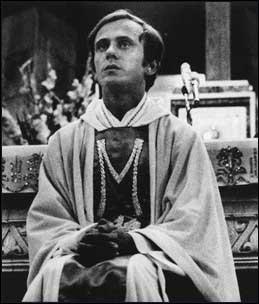
Mother of those who are deceived, pray for us.
Mother of those who are betrayed, pray for us.
Mother of those who are arrested in the night, pray for us.
Mother of those who are imprisoned, pray for us.
Mother of those who suffer from the cold, pray for us.
Mother of those who have been frightened, pray for us.
Mother of those who were subjected to interrogations, pray for us.
Mother of those innocents who have been condemned, pray for us.
Mother of those who speak the truth, pray for us.
Mother of those who cannot be corrupted, pray for us.
Mother of those who resist, pray for us.
Mother of orphans, pray for us.
Mother of those who have been molested because they wore your image, pray for us.
Mother of those who are forced to sign declarations contrary to their conscience, pray for us.
Mother of mothers who weep, pray for us.
Mother of fathers who have been so deeply saddened, pray for us.
Mother of our suffering country _____, pray for us.
Mother of our faithful country _____, pray for us.
We beg you, O mother in whom resides the hope of millions of people, grant us to live in liberty and in truth, in fidelity to you and to your Son. Amen.
Tags: blessed mother, blessed virgin mary, catholic, catholic podcast, catholic prayer, cathollc spirituality, hope, liberty, mother, prayer, suffering, truth
This entry was posted on Wednesday, October 19th, 2011 at 6:00 am
You can follow any responses to this entry through the RSS 2.0 feed.
A Prayer to Gerard Majella
[powerpress = “devotionals-prayers”]
Saint Gerard Majella April 6, 1726, Muro Lucano, Basilicata – October 16, 1755, He is the saint whose intercession is requested for children (and unborn children in particular), childbirth, mothers (and expectant mothers in particular), motherhood, falsely accused people, good confessions, lay brothers and just about anyone who desires the comfort of an understanding heart.
When he was born, he was given the name Gerard. He was the son of a tailor who died when Gerard was twelve, leaving the family in poverty. His mother then sent him to her brother so that he could teach Gerard how to sew and help the business. During this time, he was abused by a man whom his uncle sent to help him. He kept silent, but soon his uncle found out and the man who taught him resigned from the job. He loved to be like Jesus Crucified and tried at all costs to suffer. . He joined the Congregation of the Most Holy Redeemer in 1749. When falsely accused by a pregnant woman of being the father of her child, he retreated to silence. She later recanted and cleared him, and thus began his association as patron of all aspects of pregnancy. He was reputed to have bilocation and read consciences. His last will consisted of a small note on the door of his cell saying, “Here the will of God is done, as God wills, and as long as God wills.“ He died on October 16, 1755 in Caposele of tuberculosis, aged 29.
This very short synposis of his life does not do him justice, for more details of his life and so much more visit the website of the Redemptorists.Â
I found the best way to really know St. Gerard is to pray with him.  For a fuller listing of prayers and a novena to St. Gerard visit his Discerning Hearts page
Saint Gerard Prayers –
For Motherhood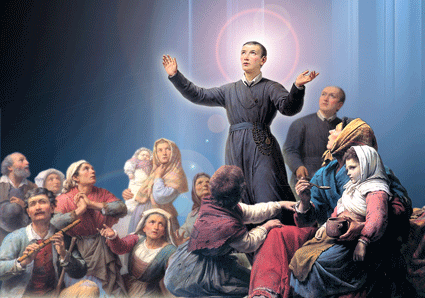
O good Saint Gerard, powerful intercessor before God and Wonderworker of our day, I call upon thee and seek thy aid. Thou who on earth didst always fulfill God’s designs, help me to do the holy Will of God. Beseech the Master of Life, from Whom all paternity proceedeth, to render me fruitful in offspring, that I may raise up children to God in this life and heirs to the Kingdom of His Glory in the world to come. Amen.
For Mother with Child
O almighty and Everlasting God Who through the operation of the Holy Christ, didst prepare the body and soul of the glorious Virgin Mary to be a worthy dwelling place of Thy divine Son; and, through the operation of the same Holy Ghost, didst sanctify Saint John the Baptist, while still in his mother’s womb; hearken to the prayers of Thy humble servant who implore thee, through the intercession of Saint Gerard, to protect her (me); that it may be cleansed by the saving water of baptism and, after a Christian life on earth, it may with its mother, attain everlasting bliss in Heaven. Amen.
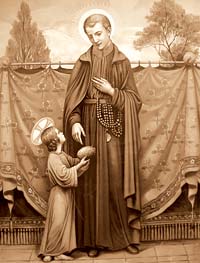 For a Sick Child
For a Sick Child
O Saint Gerard, who, like the Savior, loved children so tenderly and by your prayers freed many from disease and even from death; graciously look down upon the distressed parents who plead with thee for their child’s health if such be the Will, of God. Present their promise to God to bring up the child a good Christian and to guard it by word and example against the fatal leprosy of sin. This favor we implore thee, O sainted Brother, through the tender love with which Jesus and Mary blessed thy own innocent childhood. Amen.
In Time of Trial
O Sainted Brother Gerard, whose heart went out to the unfortunate; who relieved so many poor, healed so many sick, comforted so many afflicted; behold me worried and troubled as I kneel at thy feet. In vain to turn to men to seek consolation and help; therefore, do I have recourse to thee thou who art so powerful in heaven. Graciously assist me, Saint Gerard, that being freed from this trial or strengthened to bear it for the love of God, I may praise and thank God and serve Him with greater love and fervor. Amen.
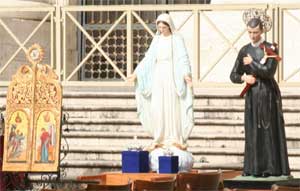 When in Rome, during the Wednesday audience, we saw them bring out a statue of St. Gerard to be blessed by our Holy Father, Pope Benedict. Of course, it would be blessed along with an image of Our Lady. I am sure wherever this statue is now, there are many candles lit requesting this wonderful saints intercession. May all their prayers be answered. St. Gerard Majella, pray for us.
When in Rome, during the Wednesday audience, we saw them bring out a statue of St. Gerard to be blessed by our Holy Father, Pope Benedict. Of course, it would be blessed along with an image of Our Lady. I am sure wherever this statue is now, there are many candles lit requesting this wonderful saints intercession. May all their prayers be answered. St. Gerard Majella, pray for us.
Tags: catholic, catholic podcast, catholic prayer, cathollc spirituality, childbirth, difficult pregnancy, gerard majella, motherhood, mothers, prayer, unwed mothers
This entry was posted on Sunday, October 16th, 2011 at 8:10 am
You can follow any responses to this entry through the RSS 2.0 feed.
Heart of Hope Part 5 – The purpose of life,  the suffering of humanity and how it relates to the grace of God. Emotional Suffering, Purgation, Christ’s sacrifice on the Cross, and Redemption.
[powerpress = “deacon-james-keating”]
 Deacon James Keating, PhD, the director of Theological Formation for the Institute for Priestly Formation, located at Creighton University, in Omaha, is making available to “Discerning Hearts” and all who listen, his series of programs entitled “The Heart of Hope”.
Deacon James Keating, PhD, the director of Theological Formation for the Institute for Priestly Formation, located at Creighton University, in Omaha, is making available to “Discerning Hearts” and all who listen, his series of programs entitled “The Heart of Hope”.
This extraordinarily popular series explores the work of suffering in the Christian life and how God can use it to transform the heart of the individual and the world. 
The “Heart of Hope”  tackles a very tough subject…the gift of suffering in the Christian life. Deacon Keating guides us well.
For more information on the “Institute of Priestly Formation” and for other material available by Deacon Keating, just click here
Don’t forget to pickup a copy of “Communion with Christ” , it is one of the best audio sets on prayer…ever!
Check out Deacon Keating’s “Discerning Heart” page
Tags: catholic, catholic podcast, catholic prayer, cathollc spirituality, creighton university, Deacon James Keating, Deacon Keating, discerning heart, institute for priestly formation, james keating, PhD, prayer, purgation, purpose of life, suffering, theological formation
This entry was posted on Thursday, October 13th, 2011 at 7:59 pm
You can follow any responses to this entry through the RSS 2.0 feed.
HUMAN HISTORY IS A HISTORY OF SALVATION – Psalm 126
VATICAN CITY, OCT. 12, 2011 (Zenit.org).- Here is a translation of the Italian-language catechesis Benedict XVI gave today during the general audience held in St. Peter’s Square. The Pope today continued his catecheses on prayer with a reflection on Psalm 126.
* * *
In the previous catecheses, we have meditated on a number of psalms of lament and of trust. Today, I would like to reflect with you on a notably joyous psalm, a prayer that sings with joy the marvels of God. It is Psalm 126 — according to Greco-Latin numbering, 125 — which extols the great things the Lord has done with His people, and which He continues to do with every believer.
The psalmist begins the prayer in the name of all Israel by recalling the thrilling experience of salvation:
“When the Lord restored the fortunes of Zion,
we were like those who dream.
Then our mouth was filled with laughter,
and our tongue with shouts of joy” (Verses 1-2a).
The psalm speaks of “restored fortunes”; that is, restored to their original state in all their former favorability. It begins then with a situation of suffering and of need to which God responds by bringing about salvation and restoring the man who prays to his former condition; indeed, one that is enriched and even changed for the better. This is what happens to Job, when the Lord restores to him all that he had lost, redoubling it and bestowing upon him an even greater blessing (cf. Job 42:10-13), and this is what the people of Israel experience in returning to their homeland after the Babylonian exile.
This psalm is meant to be interpreted with reference to the end of the deportation to a foreign land: The expression “restore the fortunes of Zion” is read and understood by the tradition as a “return of the prisoners of Zion.” In fact, the return from exile is paradigmatic of every divine and saving intervention, since the fall of Jerusalem and the deportation into Babylon were devastating experiences for the Chosen People, not only on the political and social planes, but also and especially on the religious and spiritual ones. The loss of their land, the end of the davidic monarchy and the destruction of the Temple appear as a denial of the divine promises, and the People of the Covenant, dispersed among the pagans, painfully question a God who seems to have abandoned them.
Therefore, the end of the deportation and their return to their homeland are experienced as a marvelous return to faith, to trust, to communion with the Lord; it is a “restoring of fortunes” that involves a conversion of heart, forgiveness, re-found friendship with God, knowledge of His mercy and a renewed possibility of praising Him (cf. Jeremiah 29:12-14; 30:18-20; 33:6-11; Ezekiel 39:25-29). It is an experience of overflowing joy, of laughter and of cries of jubilation, so beautiful that “it seems like a dream.” Divine help often takes surprising forms that surpass what man is able to imagine; hence the wonder and joy that are expressed in this psalm: “The Lord has done great things.” This is what the nations said, and it is what Israel proclaims:
“Then they said among the nations,
‘the Lord has done great things for them.’
The Lord has done great things for us;
we are glad” (Verses 2b-3).
God performs marvelous works in the history of men. In carrying out salvation, He reveals Himself
to all as the powerful and merciful Lord, a refuge for the oppressed, who does not forget the cry of the poor (cf. Psalm 9:10,13), who loves justice and right and of whose love the earth is filled (cf. Psalm 33:5). Thus, standing before the liberation of the People of Israel, all the nations recognize the great and marvelous things God has accomplished for His People, and they celebrate the Lord in His reality as Savior.
And Israel echoes the proclamation of the nations, taking it up and repeating it once more — but as the protagonist — as a direct recipient of the divine action: “The Lord has done great things for us”; “for us” or even more precisely, “with us,” in hebrew ‘immanû, thus affirming that privileged relationship that the Lord keeps with His chosen ones, and which is found in the nameEmmanuel, “God with us,” the name by which Jesus would be called, His complete and full revelation (cf. Matthew 1:23).
Dear brothers and sisters, in our prayer we should look more often at how, in the events of our own lives, the Lord has protected, guided and helped us, and we should praise Him for all He has done and does for us. We should be more attentive to the good things the Lord gives to us. We are always attentive to problems and to difficulties, and we are almost unwilling to perceive that there are beautiful things that come from the Lord. This attention, which becomes gratitude, is very important for us; it creates in us a memory for the good and it helps us also in times of darkness. God accomplishes great things, and whoever experiences this — attentive to the Lord’s goodness with an attentiveness of heart — is filled with joy. The first part of the psalm concludes on this joyous note. To be saved and to return to one’s homeland from exile are like being returned to life: Freedom opens up to laughter, but is does so together with a waiting for a fulfillment still desired and implored. This is the second part of our psalm, which continues: (more…)
Tags: catholic, catholic podcast, catholic prayer, cathollc spirituality, pope benedict xvi, prayer, psalm 126
This entry was posted on Wednesday, October 12th, 2011 at 5:48 pm
You can follow any responses to this entry through the RSS 2.0 feed.
Vatican City, Oct 6, 2010 / 03:54 pm (CNA/EWTN News).- Anticipating Thursday’s celebration of the Feast of Our Lady of the Rosary, the Holy Father called on the faithful to make an effort to rediscover the prayer. He urged Christians to seek intercession, protection and personal encounter with Christ through the “simple but efficient prayer,” especially during the Marian month of October.
Greeting the faithful in 10 different languages during Wednesday’s general audience, the Holy Father spoke of the Rosary as “a particular prayer of the Church and a spiritual weapon for each of us.”
He prayed that the meditation of Jesus and Mary’s life through the Rosary might be, “for all of us, light on the evangelical path of spiritual renewal and conversion of heart.”
Speaking in Portuguese, but referring to all people, he invited families to join together with the Virgin Mary so as to cooperate fully with the salvific designs of God. In Croatian, he said to ask for her intercession and protection for each person and family, exhorting prayers also for vocations to the priesthood and religious life.
In still other languages, 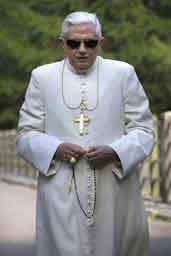 he asked that the faithful “rediscover the value” of the “simple but efficient prayer” of the Rosary “as a way for a personal encounter with Christ.”
he asked that the faithful “rediscover the value” of the “simple but efficient prayer” of the Rosary “as a way for a personal encounter with Christ.”
“October,” he said in the Italian greeting that concluded his public words on Wednesday, “is the month of the Holy Rosary, which invites us to value this prayer so dear to the tradition of the Christian people.”
Addressing some of the special guests at the audience, he said, “I invite you, dear young people, to make of the Rosary your daily prayer. I encourage you, dear sick, to grow, thanks to the recitation of the Rosary, in the trusting abandonment to the hands of God. I exhort you, dear newlyweds, to make of the Rosary a constant contemplation of the mysteries of Christ.” – CNA
Tags: catholic, catholic podcast, catholic prayer, cathollc spirituality, feast of our lady of the rosary, holy father, intercession, month of the holy rosary, prayer, prayer of the rosary, virgin mary
This entry was posted on Sunday, October 9th, 2011 at 8:29 pm
You can follow any responses to this entry through the RSS 2.0 feed.
St. Bruno was one of the most exceptional scholars, teachers, prayer warriors of his time : “…a prudent man whose word was rich in meaning.” I think the key was the gift of great humility. He must have been very close to Our Lady.
: “…a prudent man whose word was rich in meaning.” I think the key was the gift of great humility. He must have been very close to Our Lady.
The Order founded by Bruno — the Carthusians — is one of the strictest in the Church. Carthusians follow the Rule of St. Benedict, but accord it a most austere interpretation; there is perpetual silence and complete abstinence from flesh meat (only bread, legumes, and water are taken for nourishment). Bruno sought to revive the ancient eremitical (hermit)Â way of life. His Order enjoys the distinction of never becoming unfaithful to the spirit of its founder, never needing a reform.
Quote:
Rejoice, my dearest brothers, because you are blessed and because of the bountiful hand of God’s grace upon you. Rejoice, because you have escaped the various dangers and shipwrecks of the stormy world. Rejoice because you have reached the quiet and safe anchorage of a secret harbor. Many wish to come into this port, and many make great efforts to do so, yet do not achieve it. Indeed many, after reaching it, have been thrust out, since it was not granted them from above. By your work you show what you love and what you know. When you observe true obedience with prudence and enthusiasm, it is clear that you wisely pick the most delightful and nourishing fruit of divine Scripture.
~from a letter by Saint Bruno to the Carthusians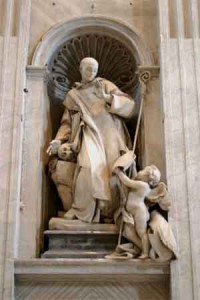
Collect:
Father,
you called St. Bruno to serve you in solitude.
In answer to his prayers
help us to remain faithful to you.
amid the changes of this world.
We ask this through our Lord Jesus Christ, your Son,
who lives and reigns with you and the Holy Spirit,
one God, forever and ever. Amen.
St. Bruno is the patron of diabolic possession. St. Bruno, confessor, ecclesiastical writer, and founder of the Carthusian Order. He was born at Cologne about the year 1030; died October 6, 1101.
Tags: Carthusians, catholic, catholic podcast, catholic prayer, cathollc spirituality, humility, prayer, silence, st bruno
This entry was posted on Thursday, October 6th, 2011 at 8:37 am
You can follow any responses to this entry through the RSS 2.0 feed.
No surprise to readers and listeners of Discerning Hearts (especially those who follow the teachings of Deacon James Keating)….”Silence is Golden”! Pope Benedict XVI has chosen “Silence and Word” as the theme for World Communication Day.
Deacon James Keating)….”Silence is Golden”! Pope Benedict XVI has chosen “Silence and Word” as the theme for World Communication Day.
Don’t you just love it…earlier we heard from Vatican Radio that the symposium of former theological students of the Holy Father that met with him this past summer reflected on what exactly is meant by the “new evangelizaation”. As reported it ultimately comes down to HUMILITY Â (click here to read and to listen to more on this report).
“Silence and Word” is the path to humility? It works for me!
From Vatican Radio:
[powerpress = Vatican-Radio]
The Pontifical Council for Social Communications on Thursday announced the theme for the 2012 World Communications Day:Â Silence and Word: path of evangelization. Below is the text of a communique from the Council explaining the theme in context:
Statement from the Pontifical Council for Social Communications on the theme for the 2012 World Communications Day
The extra-ordinarily varied nature of the contribution of modern communications to society highlights the need for a value which, on first consideration, might seem to stand in contradistinction to it.
Silence, in fact, is the central theme for the next World Communications Day Message: Silence and Word: path of evangelization. In the thought of Pope Benedict XVI, silence is not presented simply as an antidote to the constant and unstoppable flow of information that characterizes society today but rather as a factor that is necessary for its integration.
Silence, precisely because it favors habits of discernment and reflection, can in fact be seen primarily as a means of welcoming the word. We ought not to think in terms of a dualism, but of the complementary nature of two elements which when they are held in balance serve to enrich the value of communication and which make it a key factor that can serve the new evangelization.
It is clearly the desire of the Holy Father to associate the theme of the next World Communications Day with the celebration of the forthcoming Synod of Bishops which will have as its own theme: The New Evangelization for the Transmission of the Christian Faith.
World Communications Day, the only worldwide celebration called for by the Second Vatican Council (Inter Mirifica, 1963), is celebrated in most countries, on the recommendation of the bishops of the world, on the Sunday before Pentecost (in 2012, May 20).
The Holy Father’s message for World Communications Day is traditionally published in
conjunction with the Memorial of St. Francis de Sales, patron of writers (January 24).
Tags: catholic, catholic podcast, catholic prayer, cathollc spirituality, pope benedict xvi, prayer, silence
This entry was posted on Thursday, September 29th, 2011 at 2:50 pm
You can follow any responses to this entry through the RSS 2.0 feed.
Heart of Hope Part 1 – The role of the Cross in the Christian life, suffering, prayer and and how it conquers evil
[powerpress = “deacon-james-keating”]
Deacon James Keating, PhD, the director of Theological Formation for the Institute for Priestly Formation, located at Creighton University, in Omaha, is making available to â€Discerning Hearts†and all who listen, his series of programs entitled “The Heart of Hopeâ€.
This extraordinarily popular series explores the work of suffering in the Christian life and how God can use it to transform the heart of the individual and the world. 
The “Heart of Hope† tackles a very tough subject…the gift of suffering in the Christian life. Deacon Keating guides us well.
.
For more information on the “Institute of Priestly Formation†and for other material available by Deacon Keating, just click here
Don’t forget to pickup a copy of “Communion with Christ†, it is one of the best audio sets on prayer…ever!
Check out Deacon Keating’s “Discerning Heart†page
Tags: catholic, catholic podcast, catholic prayer, Catholic Spirituality, cathollc spirituality, deacon, evil, hope, james keating, prayer, suffering, the cross
This entry was posted on Thursday, September 8th, 2011 at 4:32 pm
You can follow any responses to this entry through the RSS 2.0 feed.
DIALECTIC OF PRAYER: HUMAN CRY AND DIVINE RESPONSE
VATICAN CITY, 7 SEP 2011 (VIS) – This morning Benedict XVI travelled by helicopter
from the Apostolic Palace in Castelgandolfo to the Vatican for his weekly general audience in St. Peter’s Square.
Continuing a series of catecheses on the subject of “the school of prayer”, the Holy Father turned his attention to Psalm 3 which recounts David’s flight from Jerusalem when Absalom rose against him. “In the Psalmist’s lament”, the Pope said, “each of us may recognise those feelings of pain and bitterness, accompanied by faith in God, which, according the biblical narrative, David experienced as he fled from his city”.
In the Psalm, the king’s enemies are many and powerful, and the imbalance between David’s forces and those of his persecutors “justifies the urgency of his cry for help”. Nonetheless his adversaries “also seek to break his bond with God and to undermine the faith of their victim by insinuating that the Lord cannot intervene”.
Thus, the aggression “is not only physical, it also has a spiritual dimension” aimed at “the central core of the Psalmist’s being. This is the extreme temptation a believer suffers: the temptation of losing faith and trust in the closeness of God”, the Holy Father said.
Yet, as the Book of Wisdom says, the unrighteous are mistaken because “the Lord … is like a shield protecting those who entrust themselves to Him. He causes them to raise their heads in sign of victory. Man is no longer alone … because the Lord hears the cry of the oppressed. … This intertwining of human cry and divide response is the dialectic of prayer and the key to reading the entire history of salvation. A cry expresses a need for help and appeals to the faithfulness of the other. To cry out is an act of faith in God’s closeness and His willingness to listen. Prayer express the certainty of a divine presence which has already been experienced and believed, and which is fully manifested in the salvific response of God”.
Psalm 3 presents us “a supplication replete with faith and consolation. By praying this Psalm we share the sentiments of the Psalmist: a just but persecuted figure which would later be fulfilled in Jesus. In pain, danger and the bitterness of misunderstanding and offence, the words of this Psalm open our hearts to the comforting certainty of faith. God is always close, even in times of difficulty, problems and darkness. He listens, responds and saves.
“However”, the Pope added, “it is important to be able to recognise His presence and to accept His ways: like David during his humiliating flight from his son Absalom, like the persecuted righteous of the Book of Wisdom and, finally and fully, like the Lord Jesus on Golgotha. In the eyes of the unrighteous it appeared that God did not intervene and that His Son died, but for believers it was at that precise moment that true glory was manifested and definitive salvation achieved”.
The Pope concluded: “May the Lord give us faith, may He come in aid of our weakness and help us to pray in moments of anguish, in the painful nights of doubt and the long days of pain, abandoning ourselves trustingly to Him, our shield and our glory”.
AG/ VIS 20110907 (550)
PSALM 3 From the New Advent On-line Bible:
1 The psalm of David when he fled from the face of his sonAbsalom.
 hy, OÂ Lord, are they multiplied that afflict me? many are they who rise up against me.
hy, OÂ Lord, are they multiplied that afflict me? many are they who rise up against me.
3 Many say to mysoul: There is no salvation for him in his God.
4 But you, O Lord, are my protector, my glory, and the lifter up of my head.
5 I have cried to the Lord with my voice: and he has heard me from his holy hill.
6 I have slept and have taken my rest: and I have risen up, because the Lord has protected me.
7 I will not fear thousands of the people surrounding me: arise, O Lord; save me, O my God.
8Â For you have struck all them who are my adversaries without cause: you have broken the teeth of sinners.
9 Salvation is of the Lord: and your blessing is upon your people.
Tags: catholic, catholic podcast, catholic prayer, cathollc spirituality, pope benedict, prayer, psalms
This entry was posted on Wednesday, September 7th, 2011 at 7:30 am
You can follow any responses to this entry through the RSS 2.0 feed.
On Wednesday Pope Benedict XVI challenged the men and women of today’s
world to recover the deepest meaning of art, in its multitude of expressions, but particularly as the path of beauty which leads to God. And in doing so he also shared personal memories of how art had moved him to God with the five thousand pilgrims gathered for the general audience in the tiny village of Castel Gandolfo.
He said “On several occasions during this period, I have recalled the need for every Christian to find time for God, for prayer, amid the many occupations of our daily lives. The Lord Himself gives us many opportunities to remember Him. Today I will touch briefly on one of these channels that can bring us to God and also be of help in encountering Him: it is the path of artistic expression, part of that “path of Beauty “, of which I have spoken several times and which man today should recover in its deepest meaningâ€.
Pope Benedict continued “perhaps sometimes, before a sculpture, a painting, a few verses of a poem or a song, you have experienced deep within an intimate emotion, a sense of joy, that is, you have clearly perceived that in front of you there was not only mere matter, a piece of marble or bronze, a painted canvas, a series of letters or a combination of sounds, but something bigger, something that speaks, capable of touching the heart, of communicating a message; of elevating the soul. ”
“Works of art are the fruit of human creativity, which question the visible reality, trying to discover its deep meaning and to communicate it through the language of shapes, colours, sounds.” The work of art, in short, “is an open door on the infinite,” which “opens the eyes of the mind, of the heart.”
However, he added, “there are artistic expressions that are true paths to God, the supreme Beauty, indeed they help nurture our relationship with Him in prayer. These are works that are born of faith and express faith. One example of this is when we visit a Gothic cathedral; we are enraptured by the vertical lines that shoot up towards the sky and draw our eyes and our spirits upwards, while at the same time, we feel small, and yet eager for fullness … Or when we enter a Romanesque church: we are spontaneously invited to recollection and prayer. We feel as if the faith of generations were enclosed in these splendid buildings. Or, when we hear a piece of sacred music that vibrates the strings of our heart, our soul expands and helped to turn to God. A concert of music by Johann
Sebastian Bach, in Munich, directed by Leonard Bernstein, again comes to my mind. Afterthe last piece of music, one of the Cantate, I felt, not by reasoning, but in my heart, that what I heard had conveyed to me truth, something of the truth of the great composer’s faith and this pressed me to praise and thank the Lord and beside me was the Lutheran Bishop of Munich and spontaneously, feeling this, I said to him, you know, its true, a faith and beauty so strong and irresistibly expresses the presence and truth of God”.
Pope Benedict then turned spoke of how certain artists have touched our lives : “How many times have paintings or frescoes, the fruit of the faith of the artist, in their forms, their colours, their light, encouraged us to direct our thoughts to God and nourished in us the desire to draw from the source of all beauty. What the great artist, Marc Chagall, once
wrote remains true, that for centuries painters have dipped their paintbrush in that coloured alphabet that is the Bible. How many times, then can artistic expressions be occasions to remind us of God, to help our prayer or for the conversion of the heart! Paul Claudel, a poet, playwright, and French diplomat, in the Basilica of Notre Dame in Paris, in 1886, while he was listening to the singing of the Magnificat at Christmas Mass, felt God’s presence. He had not entered the church for reasons of faith, but to in search of arguments against Christians, and instead the grace of God worked in his heart”.
The Holy Father concluded: “I invite you to rediscover the importance of this path for prayer, for our living relationship with God. The cities and towns all over the world preserve works of art that express the faith and remind us of our relationship with God. Visiting places of art, it is not only an occasion for cultural
enrichment, but above all it can be a moment of grace, an encouragement to strengthen our relationship and our dialogue with the Lord, to stop and contemplate, in the transition from simple external reality to a deeper reality, the ray of beauty that strikes us, that almost wounds us in our inner selves and invites us to rise towards God. “
And then he greeted all English speaking pilgrims present: I am pleased to greet the English-speaking pilgrims and visitors here today, especially those from Scotland and Malta. Today we reflect on the need to draw near to God through the experience and appreciation of artistic beauty. Art is capable of making visible our need to go beyond what we see and it reveals our thirst for infinite beauty, for God. Dear friends, I invite you to be open to beauty and to allow it to move you to prayer and praise of the Lord. May Almighty God bless all of you!
Tags: art, catholic, catholic podcast, catholic prayer, cathollc spirituality, music, pope benedict xvi, prayer
This entry was posted on Thursday, September 1st, 2011 at 1:00 am
You can follow any responses to this entry through the RSS 2.0 feed.
August 2011 [powerpress = devotionals-prayers]
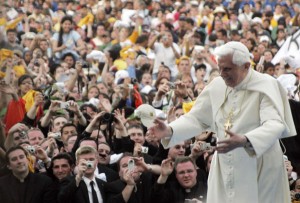 General Intention:Â That the World Youth Day taking place in Madrid may encourage all the young people of the world to root and found their lives in Christ.
General Intention:Â That the World Youth Day taking place in Madrid may encourage all the young people of the world to root and found their lives in Christ.
Missionary Intention:Â That Christians of the West, docile to the action of the Holy Spirit, may re-encounter the freshness and enthusiasm of their faith.
Tags: catholic, catholic podcast, catholic prayer, cathollc spirituality, holy father intentions, pope benedict xvi, prayer
This entry was posted on Tuesday, August 2nd, 2011 at 7:38 am
You can follow any responses to this entry through the RSS 2.0 feed.
Tags: catholic, catholic podcast, catholic prayer, cathollc spirituality, prayer
This entry was posted on Friday, July 22nd, 2011 at 6:40 am
You can follow any responses to this entry through the RSS 2.0 feed.
 Episode 9-Listening For Truth– The supernatural virtues provide for us the gifts to walk and respond to moral truths.  We need to practice the virtues to receive the wisdom of God and to be more deliberate in the love of the good.  The theological, contemplative language is foreign to many, unlike the political language in which the culture swims, and that can affect how we respond to moral questions.  What can we do to listen and respond to Truth?
Episode 9-Listening For Truth– The supernatural virtues provide for us the gifts to walk and respond to moral truths.  We need to practice the virtues to receive the wisdom of God and to be more deliberate in the love of the good.  The theological, contemplative language is foreign to many, unlike the political language in which the culture swims, and that can affect how we respond to moral questions.  What can we do to listen and respond to Truth?
[powerpress]
Deacon James Keating, PhD, the director of Theological Formation for the Institute for Priestly Formation, located at Creighton University, in Omaha, is making available to â€Discerning Hearts†and all who listen, his series of programs entitled “Listening For Truthâ€.
Listening for Truth leads men and women in a search for a fuller experience of God that begins in prayer, grows in the rediscovery of our spiritual being, and grounds itself in the truth of Jesus Christ. A presentation of the Christian life as an engagement of the whole person — body, mind, and soul — in the challenge of daily living.
For more information on the “Institute of Priestly Formation†and for other material available by Deacon Keating, just click here
Don’t forget to pickup a copy of “Communion with Christ†, it is one of the best audio sets on prayer…ever!
Check out Deacon Keating’s “Discerning Heart†page
Tags: catholic, catholic podcast, catholic prayer, cathollc spirituality, creighton university, Deacon James Keating, Deacon Keating, discernment of spirits, institute for priestly formation, political language, prayer, theological formation
This entry was posted on Thursday, July 7th, 2011 at 7:10 pm
You can follow any responses to this entry through the RSS 2.0 feed.
THE PSALMS: THE BOOK OF PRAYER PAR EXCELLENCE
VATICAN CITY, 22 JUN 2011 (VIS) – Benedict XVI dedicated his catechesis during this morning’s general audience to what he described as “the book of prayer par excellence, the Book of Psalms”. The audience was held in St. Peter’s Square in the presence of 10,000 people.
The 150 Psalms of the Book of Psalms “express all human experience“, said the Pope. “All the truth of the believer comes together in those prayers, which first the People of Israel and later the Church adopted as a special way to mediate their relationship with the one God, and as an adequate response to His having revealed Himself in history“.
“Despite the many forms of expression they contain”, the Psalms “can be divided into two broad categories: … supplication associated with lamentation, and praise. These two dimensions are related, almost indivisible, because supplication is animated by the certainty that God will respond, and this opens the way to praise and thanksgiving; while praise and thanksgiving arise from the experience of salvation received, which presupposes the need for help expressed in the supplication. … Thus, in the prayer of the Psalms, supplication and praise intertwine and fuse together in a single song which celebrates the eternal grace of the Lord as He bows down to our frailty”.
“The Psalms teach us to pray”, the Holy Father explained. “In them, the Word of God becomes the word of prayer. … People who pray the Psalms speak to God with the words of God, addressing Him with the words He Himself taught us. … Through these words it is also possible to know and accept the criteria of His actions, to approach the mystery of His thoughts and His ways, so as to grow and develop in faith and love”.
“By teaching us to pray”, the Pope went on, “the Psalms also teach us that at times of desolation, even
in moments of suffering, the presence of God is a source of wonder and consolation. We may weep, plead and seek intercession, … but in the awareness that we are advancing towards the light, where praise will be unending”.
“Equally important and significant are the manner and frequency in which the words of the Psalms appear in the New Testament, where they assume and underline that prophetic significance suggested by the link of the Book of Psalms with the messianic figure of David. In His earthly life the Lord Jesus prayed with the Psalms, and in Him they reach definitive fulfilment and reveal their fullest and deepest meaning. The prayers of the Book of Psalms, with which we speak to God, speak to us of Him, they speak of the Son, image of the invisible God Who fully reveals the Father’s face to us.
Thus Christians, by praying the Psalms, pray to the Father in Christ and with Christ, seeing those songs in a new perspective which has its ultimate interpretation in the Paschal Mystery”.
Having completed his catechesis and delivered greetings in various languages, the Pope recalled the fact that tomorrow is the Feast of Corpus Christi. He invited everyone in Rome, residents and pilgrims alike, to participate in the Mass he will celebrate at 7 p.m. tomorrow in the basilica of St. John Lateran, and in the subsequent procession along Via Merulana to the basilica of St. Mary Major. “I invite you”, he said, “to join this act of profound faith towards the Eucharist, which represents the most precious treasure of the Church and of humankind”.
AG/Â Â Â Â Â Â Â Â Â Â Â Â Â Â Â Â Â Â Â Â Â Â Â Â Â Â Â VIS 20110622 (590)
For the Psalms On-Line
The more extensive translation:
ZE11062202 – 2011-06-22
Permalink: http://www.zenit.org/article-32912?l=english
ON LEARNING TO PRAY WITH THE PSALMS
Addressing Him “With the Words That He Himself Gives Us”
VATICAN CITY, JUNE 22, 2011 (Zenit.org).- Here is a translation of the Italian-language catechesis Benedict XVI gave today during the general audience held in St. Peter’s Square. The Pope continued with his series of catecheses on prayer, turning today to a consideration of the Book of Psalms.
* * *
Dear brothers and sisters,
In the preceding catecheses, we paused to consider a number of Old Testament figures who are particularly significant for our reflection on prayer. I spoke about Abraham, who intercedes for the foreign cities; about Jacob, who in his nighttime combat receives a blessing; about Moses, who begs for forgiveness for his people; and about Elijah, who prays for the conversion of Israel. With today’s catechesis, I would like to begin down a new path: Rather than commenting on particular accounts of persons at prayer, we will enter into the “prayerbook” par excellence, the Book of Psalms. In the upcoming catecheses we will read and meditate on a number of the most beautiful psalms which are also dearest to the Church’s tradition of prayer. Today I would like to introduce them by speaking about the Book of Psalms as a whole.
The Psalter presents itself as a “formulary” of prayers, a collection of 150 psalms that the biblical tradition gives to the people of believers in order that they may become their — our prayer — our way of addressing God and of relating to Him. In this book, the whole of human experience with its many facets finds expression, along with the entire range of emotions that accompany man’s existence. In the Psalms, joy and suffering, desire for God and the perception of one’s own unworthiness, delight and the sense of abandonment, trust in God and painful solitude, fullness of life and fear of death are all interwoven and expressed. The believer’s whole reality flows into these prayers, which first the people of Israel and then the Church took up as a privileged meditation on the relationship with the one God, and the fitting response to His self-revelation in history.
As prayer, the Psalms are manifestations of the soul and of faith, in which everyone can recognize himself and in which there is communicated that experience of special closeness to God, to which each man is called. And it is the whole complexity of human existence that converges in the complexity of the different literary forms of the various psalms: hymns, lamentations, individual and collective supplication, songs of thanksgiving, penitential psalms, and other genre that are found in these poetic compositions.
Despite this wide range of expression, two great areas can be identified that synthesize the prayer of the Psalter: petition, which is connected with lament, and praise — two interconnected and almost inseparable dimensions. For petition is animated by the certainty that God will respond, and this opens up to praise and thanksgiving; and praise and thanksgiving flow from the experience of salvation received, which assumes the need for the help expressed by the petition.
In petition, the one who prays laments and describes his situation of distress, of danger, of desolation; or, as in the penitential psalms, he confesses guilt and sin, and asks to be forgiven. He lays bare his neediness before the Lord, in the confidence of being heard, and this implies an acknowledgement of God as good, as desirous of the good, and as the “lover of life” (cf. Wisdom 11:26) who is ready to help, save and forgive. Thus, for example, the Psalmist in Psalm 31 prays: “In thee, O Lord, do I seek refuge; let me never be put to shame [ … ] take me out of the net which is hidden for me, for thou art my refuge (verses 2,5 [1,4]). Therefore, already in the lament something of praise may emerge, announcing itself in the hope of divine intervention, and becoming explicit once divine salvation has become a reality.
In an analogous way — in the psalms of thanksgiving and of praise — in remembering the gift received or in contemplating the greatness of God’s mercy, one recognizes one’s own littleness as well as one’s need for salvation, which is at the foundation of petition. In this way, one confesses to God one’s own condition as a creature, inevitably marked as it is by death, and yet the bearer of a radical desire for life. For this reason, in Psalm 86 the Psalmist exclaims: “I give thanks to thee, o Lord my God, with my whole heart, and I will glorify thy name forever. For great is thy steadfast love toward me; thou hast delivered my soul from the depths of Sheol” (verses 12, 13). In this way, in the prayer of the Psalms, petition and praise are interwoven and blend together into one unique song that celebrates the Lord’s eternal grace that bends down to our frailty.The book of the Psalter was given to Israel and to the Church precisely in order that the people of believers might be permitted to unite themselves to this song. The Psalms, in fact, teach us to pray. In them, the Word of God becomes the word of prayer — and they are the Psalmists’ inspired words — which also become the word of the one who prays the Psalms. This is the beauty and the special nature of this biblical book: Unlike other prayers we find in sacred Scripture, the prayers contained [in the Book of Psalms] are not inserted into a narrative story which specifies either their meaning or their function. The Psalms are given to the believer precisely as a text of prayer, which has as its one end that of becoming the prayer of the one who takes them up and, with them, addresses himself to God. Since they are the Word of God, he who prays the Psalms speaks to God with the very words that God has given to us; he addresses Him with the words that He Himself gives us. Thus, in praying the Psalms we learn to pray. They are a school of prayer.
Something analogous happens when a child begins to talk; when he learns, that is, to express his feelings, emotions, and needs with words that do not belong to him naturally, but which he learns from his parents and from those who live around him. What the child wants to express is his own personal experience, but the means of expression belong to others; and little by little he appropriates them — the words received from his parents become his words, and through those words he also learns a way of thinking and feeling; he enters into a whole world of concepts, and in this [world] he grows, relates with reality, with men and with God. At last, the language of his parents becomes his language; he speaks with the words received from others, which by now have become his words.
And so it is with the prayer of the Psalms. They are given to us so that we might learn to address ourselves to God, to communicate with Him, to talk to Him about ourselves with His words, to find language for an encounter with Him. And, through those words, it will also be possible to know and to receive the standards of his way of acting, to approach the mystery of his thoughts and of his ways (cf. Isaiah 55:8-9), so as to grow always more in faith and love. As our words are not only words, but also teach us about a real and conceptual world, so also these prayers teach us about the heart of God, for which reason are we able not only to speak with God, but also to learn who God is and — in learning how to speak with Him — we learn what is it to be man, to be ourselves.
In this regard, the title given to the Psaltery by the Jewish tradition appears significant. It is called Tehellim, an Hebraic term that means “songs of praise,” [which comes] from the root word we find in the expression “Halleluiah” — literally: “praise the Lord.” Thus, even though this prayerbook is so multifaceted and complex — with its various literary genre and with its connection between praise and petition – it is ultimately a book of praise, that teaches us to give thanks, to celebrate the greatness of the gift of God, to acknowledge the beauty of His words and to glorify His holy Name.
This is the most fitting response before God’s self-revelation, and the experience of His goodness. By teaching us to pray, the Psalms teach us that, even in the midst of desolation, in suffering, God’s presence remains and is the source of wonder and of consolation; we can cry, beg, intercede, lament, but [we do so] in the knowledge that we are walking toward the light, where praise can be definitive; “in thy light do we see light” (Psalm 36:10 [9]).
But beyond the book’s general title, the Jewish tradition has also given specific titles to many of the psalms, attributing them in great part to King David. A figure of notable human and theological depth, David is a complex personality who passed through the most varied experiences fundamental to life. A young shepherd of his father’s flock — passing through the ups and downs and at times dramatic events of life — he becomes king of Israel, the shepherd of God’s people. Although a man of peace, he fought many wars; an untiring and tenacious seeker of God, yet he betrayed His love, and this is characteristic: He always remained a seeker of God, even though he sinned gravely many times; a humble penitent, he received divine forgiveness, even divine pity, and he accepted a fate marked by suffering. Thus, in all his weakness, David was a king “after God’s own heart” (cf. 1 Samuel 13:14); that is, a passionate man of prayer, a man who knew what it meant to petition and to praise. The connection of the Psalms with this illustrious king of Israel is important, then, for he is a messianic figure, the Lord’s Anointed, in whom the mystery of Christ is in some way foreshadowed.Just as important and meaningful are the ways and frequency with which the words of the psalms are repeated in the New Testament, taking up and underscoring the prophetic value suggested by the Psalter’s connection with the messianic figure of David. In the Lord Jesus, who during His earthly life prayed with the Psalms, they find their definitive fulfillment and reveal their fullest and most profound meaning. The prayers of the Psalter, with which we speak to God, speak to us of Him, they speak to us of the Son, the image of the invisible God (Colossians 1:15), who fully reveals to us the Face of the Father. The Christian, therefore, in praying the Psalms, prays to the Father in Christ and with Christ, taking up those songs within a new perspective, which finds its ultimate interpretative key in the Paschal mystery. Thus do the horizons of the one who prays open up to unexpected realities — each Psalm acquires a new light in Christ and the Psalter is able to shine in all its infinite richness.
Dearest brothers and sisters, let us take this holy book in hand; let us allow ourselves to be taught by God to address ourselves to Him; let us make the Psalter a guide that helps us and accompanies us daily along the way of prayer. And let us, like Jesus’ disciples, also ask: “Lord, teach us to pray” (Luke 11:1), opening our hearts to receive the Teacher’s prayer, in which all prayers attain their fulfillment. Thus, made sons in the Son, will we be able to speak to God calling Him “Our Father.” Thank you.
[Translation by Diane Montagna]
Tags: catholic, catholic podcast, catholic prayer, cathollc spirituality, pope benedict xvi, prayer, psalms
This entry was posted on Wednesday, June 22nd, 2011 at 9:23 am
You can follow any responses to this entry through the RSS 2.0 feed.

